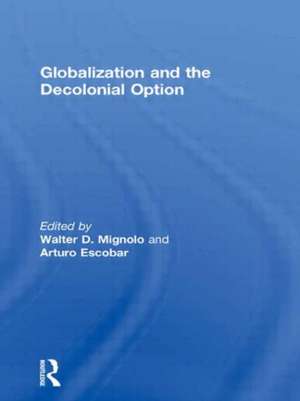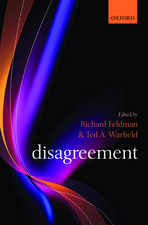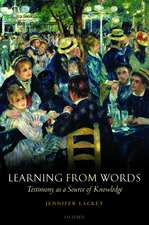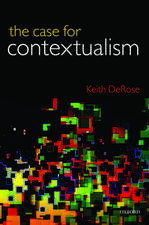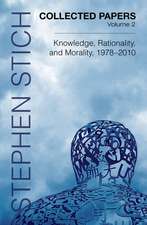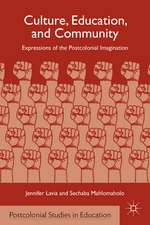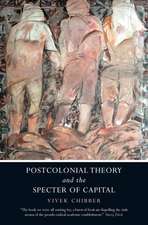Globalization and the Decolonial Option
Editat de Walter D. Mignolo, Arturo Escobaren Limba Engleză Hardback – 21 sep 2009
Epistemic decolonization, or de-coloniality, becomes the horizon to imagine and act toward global futures in which the notion of a political enemy is replaced by intercultural communication and towards an-other rationality that puts life first and that places institutions at its service, rather than the other way around.
The volume is profoundly inter- and trans-disciplinary, with authors writing from many intellectual, transdisciplinary, and institutional spaces.
This book was published as a special issue of Cultural Studies.
| Toate formatele și edițiile | Preț | Express |
|---|---|---|
| Paperback (1) | 489.10 lei 6-8 săpt. | |
| Taylor & Francis – 15 apr 2013 | 489.10 lei 6-8 săpt. | |
| Hardback (1) | 1011.33 lei 6-8 săpt. | |
| Taylor & Francis – 21 sep 2009 | 1011.33 lei 6-8 săpt. |
Preț: 1011.33 lei
Preț vechi: 1233.33 lei
-18% Nou
Puncte Express: 1517
Preț estimativ în valută:
193.58€ • 210.34$ • 162.71£
193.58€ • 210.34$ • 162.71£
Carte tipărită la comandă
Livrare economică 21 aprilie-05 mai
Preluare comenzi: 021 569.72.76
Specificații
ISBN-13: 9780415549714
ISBN-10: 041554971X
Pagini: 424
Dimensiuni: 156 x 234 x 24 mm
Greutate: 0.77 kg
Ediția:New.
Editura: Taylor & Francis
Colecția Routledge
Locul publicării:Oxford, United Kingdom
ISBN-10: 041554971X
Pagini: 424
Dimensiuni: 156 x 234 x 24 mm
Greutate: 0.77 kg
Ediția:New.
Editura: Taylor & Francis
Colecția Routledge
Locul publicării:Oxford, United Kingdom
Public țintă
PostgraduateCuprins
1. Introduction: Coloniality of Power and De-Colonial Thinking Walter D. Mignolo I The Emergence of An-Other-Paradigm 2. Coloniality and Modernity/Rationality Aníbal Quijano 3. Worlds and Knowledges Otherwise: The Latin American Modernity/Coloniality Research Program Arturo Escobar 4. The Epistemic Decolonial Turn: Beyond Political-Economy Paradigms Ramón Grosfoguel 5. Shifting the Geopolitics of Critical Knowledge: Decolonial Thought and Cultural Studies ‘Others’ in the Andes Catherine Walsh II (De)Colonization of Knowledges and of Beings 6. On the Coloniality of Being: Contributions to the Development of a Concept Nelson Maldonado-Torres 7. Decolonization and the Question of Subjectivity: Gender, Race, and Binary Thinking Freya Schiwy III The Colonial Nation-States and the Imperial Racial Matrix 8. The Nation: An Imagined Community? Javier Sanjinés 9. Decolonial Moves: Trans-locating African Diaspora Spaces Agustin Lao-Montes 10. Unsettling Race, Coloniality, and Caste: Anzaldua's Borderlands/La Frontera, Martinez’s 'Parrot in the Oven', and Roy’s 'The God of Small Things' José David Saldívar IV (De)Coloniality at Large 11. The Eastern Margins of Empire: Coloniality in 19th Century Romania Manuela Boatca 12. (In)edible Nature: New World Food and Coloniality Zilkia Janer 13. The Imperial-Colonial Chronotype: Istanbul-Baku-Khurramabad Madina Tlostanova V On Empires and Colonial/Imperial Differences 14. The Missing Chapter of Empire: Postmodern Reorganization of Coloniality and Post-Fordist Capitalism Santiago Castro-Gómez 15. Delinking: The Rhetoric of Modernity, the Logic of Coloniality and the Grammar of De-Coloniality Walter D. Mignolo 16. The Coloniality of Gender Maria Lugones 17. Afterword Arturo Escobar
Recenzii
"Overall, the book is a valuable contribution to understanding the force of coloniality in shaping the modern state, the production of subjectivity and knowledge, and global political economy and could become a significant source for the project of decolonizing sociology." - Roger Merino, University of Bath, UK
Descriere
If the secular was an option that Europe offered to the world and transformed European imperialism, the decolonial option is emerging from the non-European world as responses to both Christianity and the European secular.
This book was published as a special issue of Cultural Studies.
This book was published as a special issue of Cultural Studies.
